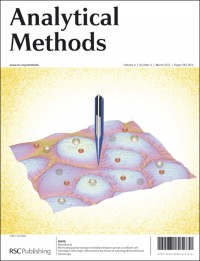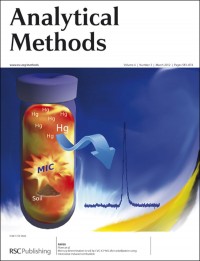Issue 3 of Analytical Methods is now available for you to browse.
We take you to Germany and Brazil on this month’s covers: transport across cell monolayers studied by SECM, and the determination of mercury in soil by CVG-ICP-MS.
The front cover features a paper from our web theme on Future Electroanalytical Developments, a collaborative effort with our sister journal, Analyst. Frank-Michael Matysik and co-workers from the University of Regensberg, Germany, have used scanning electrochemical microscopy (SECM) for time-resolved studies of passive transport of redox active substances across cell monolayers with sub-cellular resolution. They say that the experimental approach presented in this study is an attractive alternative to conventional methods using Ussing-type chambers and opens new perspectives for studies of diffusion of substances through cell monolayers with single-cell resolution.
Monitoring passive transport of redox mediators across a confluent cell monolayer with single-cell resolution by means of scanning electrochemical microscopy
Stefan Bergner, Joachim Wegener and Frank-Michael Matysik
Anal. Methods, 2012, 4, 623-629
DOI: 10.1039/C1AY05468F
Our colourful inside front cover highlights work from Erico Flores of Universidade Federal de Santa Maria, Brazil, and his collaborators. They applied microwave-induced combustion (MIC) for mercury volatilization from soil with subsequent determination by cold vapor generation coupled with inductively coupled plasma mass spectrometry (CVG-ICP-MS). The authors say that their proposed method for soil decomposition combines safety and relatively high sample throughput, both of which are important aspects for routine trace analysis.
Mercury determination in soil by CVG-ICP-MS after volatilization using microwave-induced combustion
Rochele S. Picoloto, Helmar Wiltsche, Günter Knapp, Juliano S. Barin and Erico M. M. Flores
Anal. Methods, 2012, 4, 630-636
DOI: 10.1039/C1AY05410D
Both the cover articles will be free to access for 6 weeks. If your institution doesn’t yet have access to Analytical Methods, let us know: we don’t want you to miss out!












